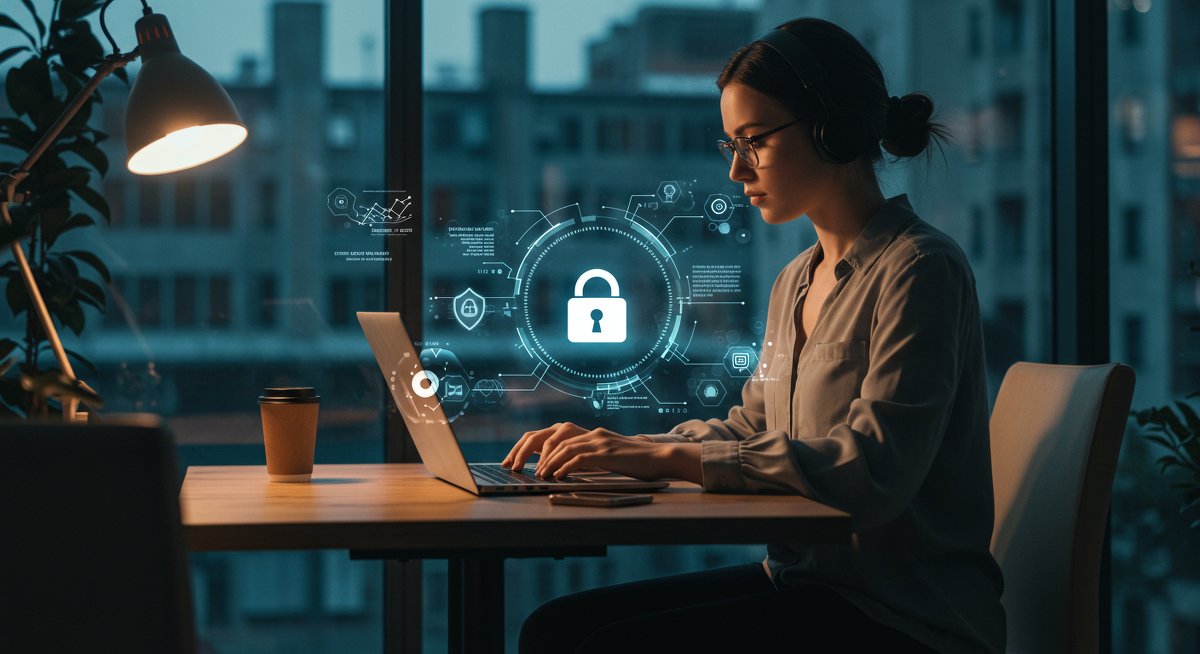Are you dreaming of a life of travel and remote work? The digital nomad lifestyle offers incredible freedom, but it also comes with unique cybersecurity challenges. As you embark on this exciting journey, protecting your digital life becomes paramount. This guide provides essential cybersecurity tips and actionable strategies for aspiring digital nomads in 2025, ensuring you can work and explore the world with confidence. We'll cover common threats, practical solutions, and the tools you need to stay safe on the go.

Why Embracing Cybersecurity Matters for Your Nomad Journey
Your digital life is your lifeline as a digital nomad. It's how you work, communicate, manage finances, and stay connected. But with this connectivity comes risk. Public Wi-Fi hotspots, unsecured devices, and phishing scams are just a few of the threats you'll encounter. Failing to secure your digital footprint can lead to data breaches, identity theft, financial loss, and even the compromise of your travel plans. Think of your digital security as a crucial layer of protection, just like travel insurance or a secure place to store your passport. A proactive approach to cybersecurity allows you to enjoy the benefits of the nomad lifestyle without unnecessary worry.
Consider this: a fellow nomad, Sarah, connected to an unsecured Wi-Fi network in a busy cafe. She unknowingly clicked a link in a phishing email and her work laptop got infected with malware. This resulted in the loss of critical client data, and a major disruption in her income. This could have been prevented with some basic cybersecurity precautions. Another example is Mark, who had his bank account information stolen while using a compromised public Wi-Fi network. The thieves gained access to his accounts and drained his funds, putting a stop to his travel plans. Or there's Emily, who had her social media accounts hacked because she used weak passwords. The hackers used these accounts to spread misinformation and damage her reputation. This emphasizes the importance of robust security measures from the start.
Essential First Steps to Become a Digital Nomad
Before you even book your first flight, take these crucial first steps to establish a strong cybersecurity foundation:
Secure Your Devices:
- Strong Passwords: Use unique, strong passwords for all accounts. A password manager can help generate and store complex passwords. A strong password should be at least 12 characters long and include a mix of uppercase and lowercase letters, numbers, and symbols.
- Two-Factor Authentication (2FA): Enable 2FA on all accounts that offer it. This adds an extra layer of security by requiring a second verification method, such as a code sent to your phone, in addition to your password.
- Keep Software Updated: Regularly update your operating system, web browser, and all software to patch security vulnerabilities.
Understand Public Wi-Fi Risks:
- Avoid Unsecured Networks: Never transmit sensitive information (banking details, passwords, etc.) over an unencrypted Wi-Fi network. Look for networks that use WPA2 or WPA3 encryption.
- Use a VPN: A Virtual Private Network (VPN) encrypts your internet traffic, making it unreadable to potential eavesdroppers. This is essential for safe browsing on public Wi-Fi.
Implement Basic Security Software:
- Antivirus Software: Install reliable antivirus software and keep it updated to protect against malware.
- Firewall: Ensure your device's firewall is enabled to block unauthorized access.
Educate Yourself:
- Phishing Awareness: Learn to recognize phishing attempts (emails, messages, or websites that try to steal your information). Never click suspicious links or download attachments from unknown senders.
- Regular Backups: Back up all your important data to the cloud or an external hard drive. This ensures you can recover your data in case of a security breach or device failure.
Common Beginner Challenges & How to Overcome Them
New digital nomads often face specific cybersecurity challenges. Here's how to overcome them:
- Challenge 1: Public Wi-Fi Vulnerabilities:
- Solution: Always use a VPN when connecting to public Wi-Fi. Consider using your phone as a personal hotspot if a secure Wi-Fi network isn't available. Another tip is to avoid performing sensitive transactions (banking, email) on public Wi-Fi.
- Example: John, a new nomad, was working at a coffee shop and logged into his bank account using the cafe's Wi-Fi without a VPN. His credentials were stolen, and money was taken from his account. Had he used a VPN, his information would have been encrypted, preventing the theft.
- Challenge 2: Device Security:
- Solution: Use strong passwords, enable two-factor authentication, and keep your devices updated. Consider using a password manager to generate and securely store complex passwords.
- Example: Maria realized her laptop was hacked because she was using the same weak password across all her accounts. After a bit of research, she started using unique passwords and a password manager, which significantly improved her security.
- Challenge 3: Phishing Attacks:
- Solution: Be wary of unsolicited emails, messages, or links. Verify the sender's identity before clicking on any links or downloading attachments. A basic measure is to learn to identify suspicious emails and be skeptical of anything that seems too good to be true.
- Example: Tom clicked on a link in an email that looked like it was from his bank. The link led him to a fake website that stole his login credentials. Luckily, he recognized the issue quickly, but the situation taught him to be extra careful about checking email senders.
Tips for Success (e.g., budgeting, finding remote jobs)
Invest in a VPN: A VPN (Virtual Private Network) is crucial for encrypting your internet traffic, especially when using public Wi-Fi. Choose a reputable VPN provider with a strong no-logs policy.
- Example: Consider NordVPN (https://nordvpn.com/) for secure browsing and access to geo-restricted content. This is essential for safe browsing on public Wi-Fi.
Use a Password Manager: A password manager securely stores and generates strong passwords, making it easier to manage your online accounts.
- Example: Services like 1Password or LastPass help keep your accounts secure by generating strong, unique passwords for each of your online accounts.
Enable Two-Factor Authentication (2FA): Enable 2FA on all your accounts, as it adds an extra layer of security. Use an authenticator app or hardware security key.
Keep Your Software Updated: Regularly update your operating system, web browser, and all software to patch security vulnerabilities.
Be Aware of Phishing: Be cautious of suspicious emails or links. Verify the sender's identity before clicking any links or downloading attachments.
Secure Your Devices: Use strong passwords and enable features like remote device wiping in case of theft.
Create Secure Backups: Regularly back up your important data to the cloud or an external hard drive.
Building a Sustainable Nomad Lifestyle
Integrating cybersecurity into your lifestyle involves consistent effort and vigilance. Here’s how to build a sustainable cybersecurity practice:
- Establish a Routine: Make cybersecurity a regular part of your workflow. This includes checking for software updates, running antivirus scans, and reviewing your password security.
- Stay Informed: Keep up-to-date with the latest cybersecurity threats and best practices by following reputable security blogs and news sources.
- Regular Audits: Periodically review your security setup, including your passwords, devices, and software. This helps you identify any weaknesses.
- Share Best Practices: Educate and help other digital nomads, sharing your knowledge and tips for staying safe online.
- Adapt and Adjust: As threats evolve, so should your security measures. Stay flexible and adapt your practices based on new risks and best practices.

Recommended Resources for New Nomads
- Security Blogs and Websites: Follow reputable cybersecurity blogs, such as KrebsOnSecurity and the SANS Institute, to stay informed about the latest threats and best practices.
- Password Managers: 1Password, LastPass, and Bitwarden are excellent password managers to securely store and manage your passwords.
- VPN Providers: NordVPN (https://nordvpn.com/) offers great security and is an industry leader.
- Antivirus Software: Consider reputable antivirus software, like McAfee or Norton, for device protection.
- Cybersecurity Courses: Take online courses on cybersecurity basics to build your knowledge.
- Travel Insurance: SafetyWing offers travel insurance that can cover cyberattacks, along with a range of other issues, safeguarding you against financial setbacks (https://www.safetywing.com/).
Quick Wins for Your First Nomad Trip
Before your first trip, implement these quick wins:
- Set up 2FA: Enable 2FA on all your essential accounts (email, banking, social media).
- Install a VPN: Choose a reliable VPN provider and install it on all your devices.
- Update Your Software: Ensure your operating system, web browser, and other software are up to date.
- Create Strong Passwords: Generate strong, unique passwords for all your accounts, using a password manager.
- Back Up Your Data: Back up your important data to the cloud or an external hard drive.
Next Steps in Your Location Independent Life
Your cybersecurity journey is ongoing. As you become more experienced, explore advanced strategies like:
- Using a Hardware Security Key: Consider using a hardware security key (e.g., YubiKey) for even stronger authentication.
- Implementing a Zero-Trust Model: Adopt a zero-trust security model, which assumes that no user or device, inside or outside the network, should be automatically trusted.
- Staying Updated on Threats: Stay informed about new and emerging threats by following security news and blogs.
- Regular Security Audits: Conduct regular audits of your security setup to identify and address any vulnerabilities.
By following these steps, you can enjoy a secure and rewarding digital nomad lifestyle. Embrace the freedom of remote work while safeguarding your digital life. Safe travels!